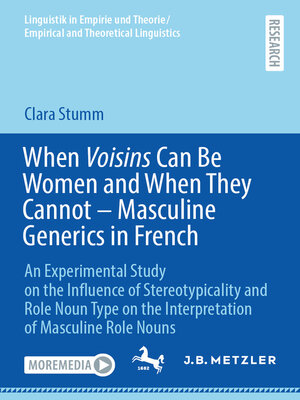When Voisins Can Be Women and When They Cannot – Masculine Generics in French
ebook ∣ An Experimental Study on the Influence of Stereotypicality and Role Noun Type on the Interpretation of Masculine Role Nouns · Linguistik in Empirie und Theorie/Empirical and Theoretical Linguistics
By Clara Stumm

Sign up to save your library
With an OverDrive account, you can save your favorite libraries for at-a-glance information about availability. Find out more about OverDrive accounts.
Find this title in Libby, the library reading app by OverDrive.



Search for a digital library with this title
Title found at these libraries:
| Library Name | Distance |
|---|---|
| Loading... |
This book examines whether masculine plural role nouns in French trigger a male-specific interpretation. By closely replicating the French sample of an experiment run by Gygax et al. in 2008, Experiment 1 suggests that stereotypically male, neutral and female masculine role nouns tend to be associated with men. Experiment 2 focuses on the role noun type of stereotypically neutral role nouns (occupational nouns vs. non-occupational nouns) and indicates that the masculine role nouns were interpreted as referring to both men and women. While the findings of Experiment 1 align with an extensive body of previous empirical research, the results of Experiment 2 challenge most previous findings. In other words, the interpretation of masculine role nouns seems to be influenced by multiple factors and appears to be a complex phenomenon. In this vein, the approach sketched in this book is a step towards understanding the interpretation of masculine role nouns as a multifactorial phenomenon.







